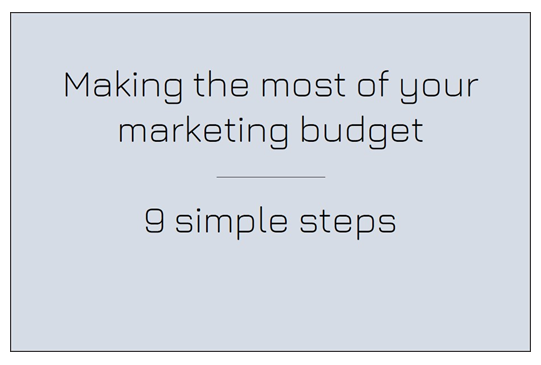Nine steps to help make the most of any size marketing budget

When I challenge business leaders to justify an element of their marketing activity, you might be surprised how often the reply is, ‘that’s how we’ve always done it.’ The original rationale has been lost is the mists of time.
Whether your annual marketing budget runs to just a few thousand pounds or several million, it’s a good idea to regularly review your marketing activity to make sure you’re getting the best possible return on investment. Here are some steps that I like to follow when budgeting for the year ahead, and I keep them in mind throughout the year to make sure it all stays focussed.
- Objectives
Every sensible marketing strategy will start with clear and measurable objectives that are aligned with the wider business plan. Every piece of marketing activity should be aligned to these objectives as part of a holistic strategy.
- Segmentation and targeting
Our objectives define what we’re trying to achieve, but there are invariably a number of possible tactics that could be used to meet those objectives. Identifying who you want to target is really useful at this stage. Once you know who you want to reach, it is easier to identify the best media and messaging for each target group.
- Challenge the status quo
The fact that you have always invested in a particular activity, doesn’t necessarily mean it is right to continue to do so. Year on year, your business objectives change, your competitors change, customer and market demand changes, and in this digital age the marketing opportunities change frequently too.
I’m not saying all (or even any) past activity is wrong. I am suggesting that every activity should be sense-checked on a regular basis to make sure it’s still relevant to your objectives and that the priorities have not changed.
- Don’t be afraid to try something new
It is often the case that you won’t know how well a particular piece of marketing activity will work for your business until you try it. Trying new tactics, new media, new messages, new targeting and new timing is all to be encouraged. But it should be done in a controlled way, with appropriate testing in place, and alongside some of the more established activity that you know will deliver a reliable result.
- Prioritise and tie back to objectives
I like to start my planning with a blank sheet and then list down all the possible activity that could contribute towards achieving my marketing objectives. Some of this I designate ‘core activity’ – the things that have to happen like website maintenance, hosting, SEO and content creation. I call everything else ‘complementary activity’. Thereafter, it’s a numbers game – if I don’t have the budget for everything, I need to prioritise according to what will deliver the best results… but sometimes you can make the budget go further by reviewing your suppliers.
- Big agencies have big overheads
Many businesses out-source at least some of their marketing to agencies. The bigger agencies with city-centre offices can be an attractive proposition for larger companies that need big teams on their accounts and can afford to pay the higher agency fees. But for small and medium-sized businesses with a more modest marketing budget, it makes sense to find a smaller agency without the fancy offices and the big overheads that go with them.
There are plenty of very skilful and experienced smaller agencies and freelancers out there who are more flexible, more responsive and don’t charge high hourly rates… so your budget goes further and your return on investment increases.
- Pick your media
I mentioned segmentation and targeting earlier. When choosing your media, it’s really important to bear in mind who you are trying to reach and how best to communicate with them. Let me give you a couple of examples:
I have come across a few B2B organisations that have spent a significant amount of time and money on Facebook and Facebook advertising. Whilst there are always exceptions to every rule, Facebook tends to be a platform that people use in their personal lives. It can be useful for some B2C businesses, but has limited appeal for B2B. Not only is this wasted advertising spend, it can also generate a lot of work in responding to comments and questions from consumers who will never be customers.
Pay Per Click advertising is another of those advertising media that can be great for a business where you want to target a broad range of people, particularly in a B2C retail environment. But if you want to reach a smaller, more targeted audience, PPC advertising can be both expensive and ineffective. Whilst you can tailor the wording in the adverts to attract the attention of your target group, the likelihood is that your ad will be clicked by people that are not in your target market, and you will end up paying for those irrelevant clicks.
- Measure, review, evolve
Whilst the effectiveness of some above-the-line media (like print, radio, television, posters etc.) can be difficult to measure directly, digital marketing can be tracked and analysed in considerable detail. Getting a reliable measure of ROI can be complex – you can read more about marketing metrics in a dedicated article here – but measuring what you can in a consistent manner will enable you to review your results and make any changes that are necessary. The key message here is to challenge your own plans and remain open-minded and flexible enough to change them if they are not working.
- Out-sourced marketing
For many businesses, the employment costs of the people in the marketing department may be treated separately in the accounts to the marketing spend. But if budgets are being squeezed, it may be worth considering reducing the head count and out-sourcing some of the marketing activity instead. This can often prove to be both cost-effective and more flexible.
49 Red is a marketing agency with a difference. We can offer impartial advice to small and medium sized businesses, helping them to make the most of their marketing budget. Contact us today at www.49red.co.uk to find out more.



